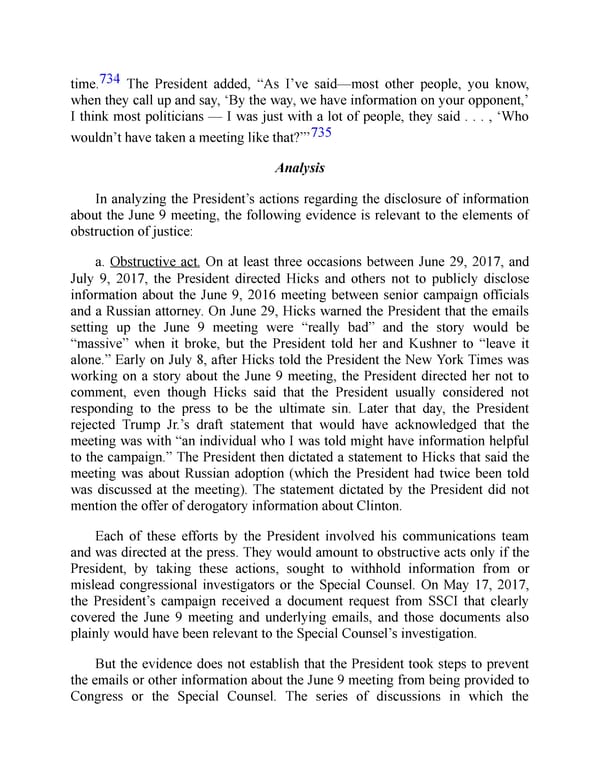734 time. The President added, “As I’ve said—most other people, you know, when they call up and say, ‘By the way, we have information on your opponent,’ I think most politicians — I was just with a lot of people, they said . . . , ‘Who 735 wouldn’t have taken a meeting like that?”’ Analysis In analyzing the President’s actions regarding the disclosure of information about the June 9 meeting, the following evidence is relevant to the elements of obstruction of justice: a. Obstructive act. On at least three occasions between June 29, 2017, and July 9, 2017, the President directed Hicks and others not to publicly disclose information about the June 9, 2016 meeting between senior campaign officials and a Russian attorney. On June 29, Hicks warned the President that the emails setting up the June 9 meeting were “really bad” and the story would be “massive” when it broke, but the President told her and Kushner to “leave it alone.” Early on July 8, after Hicks told the President the New York Times was working on a story about the June 9 meeting, the President directed her not to comment, even though Hicks said that the President usually considered not responding to the press to be the ultimate sin. Later that day, the President rejected Trump Jr.’s draft statement that would have acknowledged that the meeting was with “an individual who I was told might have information helpful to the campaign.” The President then dictated a statement to Hicks that said the meeting was about Russian adoption (which the President had twice been told was discussed at the meeting). The statement dictated by the President did not mention the offer of derogatory information about Clinton. Each of these efforts by the President involved his communications team and was directed at the press. They would amount to obstructive acts only if the President, by taking these actions, sought to withhold information from or mislead congressional investigators or the Special Counsel. On May 17, 2017, the President’s campaign received a document request from SSCI that clearly covered the June 9 meeting and underlying emails, and those documents also plainly would have been relevant to the Special Counsel’s investigation. But the evidence does not establish that the President took steps to prevent the emails or other information about the June 9 meeting from being provided to Congress or the Special Counsel. The series of discussions in which the
 Mueller Report PDF Page 371 Page 373
Mueller Report PDF Page 371 Page 373